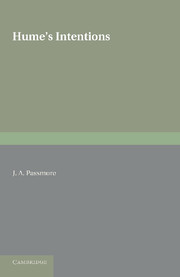Book contents
CHAPTER VII - THE SCEPTIC
Published online by Cambridge University Press: 05 June 2016
Summary
Hume takes scepticism very seriously; in this respect, as in so many others, his attitude is that of a French rather than a British philosopher. In France, scepticism was a live issue; but immense volumes like de Crousaz’ Examen du Pyrrhonisme Ancien et Moderne (1733) had no British analogue. When Berkeley inveighed against ‘the sceptics’, the scepticism he had in mind was a relatively milk-and-water affair, very different from the hardy speculations of Montaigne and Bayle. It had two principal constituents: the doctrine that we cannot ‘penetrate into the inward essence and constitution of things’, and the doctrine that ‘the mind of man being finite’ it is bound to run into ‘absurdities and contradictions’ when it ‘treats of things which partake of Infinity’. Hume quite liked scepticism in this, the Locke-Malebranche form; he made use of it in his assault on metaphysics and in chastening the pretensions of physical science. Pyrrhonism was a different matter: a useful servant, in so far as it was directed against the possibility of solving philosophical doubts by philosophical methods, it threatened to become the master, and to destroy the science of man itself.
And yet Hume's imagination certainly responded to the daring and sweep of Pyrrhonism, as Bayle described it. ‘An attempt to run down all science’, Bayle wrote, ‘and to reject not only the testimony of Sense, but that of Reason too, is the boldest that ever was formed in the Republic of Letters. It is like that of the Alexanders, and other conquerors who would subdue all nations.’
Bold projects of this sort appealed to Hume; his object, according to the Introduction to the Treatise, is ‘to march up directly to the capital or centre of these sciences, to human nature itself; which being once masters of, we may every where else hope for an easy victory’ (T, xx). Still, it was science he hoped to conquer; and Pyrrhonism threatened to turn his dominions into a dream-kingdom. The sceptical project which Bayle envisaged was one Hume could quite easily compass; and yet, at the same time, he had no intention of permanently persisting in a sceptical conclusion. Science, not merely peace of mind, was his objective; this fact sharply separated him from the classical sceptics.
- Type
- Chapter
- Information
- Hume's Intentions , pp. 132 - 151Publisher: Cambridge University PressPrint publication year: 2013



